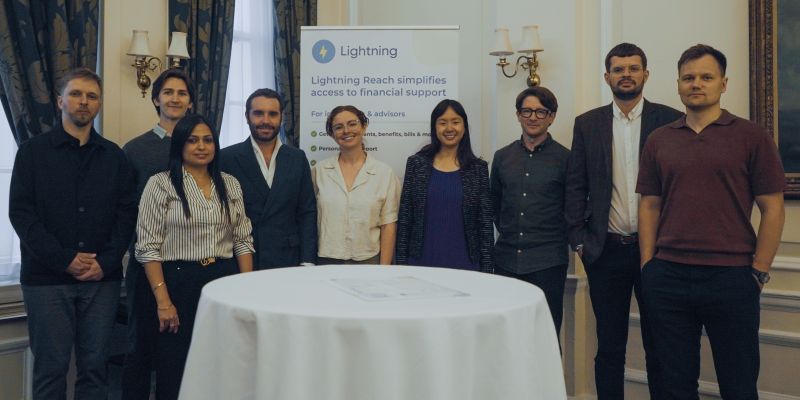Introducing the next of our 'Meet the Investor' mini-series! This week, we're spotlighting Harmony Chan, Social Investment Portfolio Manager at Joseph Rowntree Foundation (JRF), as she explores the challenges and opportunities for the organisation in 2024, alongside memorable investments, top tips, changes needed for the sector and more!
All about you
What is your name?
Harmony Chan
What is your job title?
Social Investment Portfolio Manager
How long have you worked at JRF?
Since September 2022
Where are you from / where are you based now?
I grew up in Worcestershire but I’ve moved to London for work in 2018 and am still here, for now!

Spotlight on Joseph Rowntree Foundation
What does a typical day look like at JRF?
A typical day includes corresponding with both existing and potential investee organisations, whether that be reading through reports they’ve sent over, or chatting about what they are currently working on. I might also speak to colleagues across the social investment sector as I’m often collaborating, be that working together on investments or sector-wide initiatives. In practical terms this means sending emails, two or three meetings, and many trips to the biscuit tin (at home or in the office)!
What’s the best thing about working at JRF?
Our colleagues, who do amazing work towards our mission of ending poverty in the UK. This spans from creating research that drives important policy recommendations, communicating this work, campaigning for changes to be made, and funding exciting storytellers and partners.
What’s most important to JRF when looking at organisations to invest in?
The most important thing is that organisations align to JRF’s vision, which is “to support and speed up the transition to a more equitable and just future, free from poverty, where people and planet can flourish.” As part of this, we care that our investees are aligned to specific commitments we’ve made. For example, we are a Living Wage Funder and encourage our investees to pay employees and contractors the real Living Wage. We are also committed to being an anti-racist organisation and you can find out more about this work here.
What does your organisation offer in terms of social investment – are there any specific products or social issues that you prioritise?
At JRF, we are flexible in financial products that we can offer depending on the need of the investee organisation. We can invest in funds and direct investments. The bulk of our portfolio is currently in funds or loans, but in more recent years we have made small equity investments and one repayable grant too. We prioritise topics that our colleagues at JRF are working on, for example Care, Housing, Deep poverty and destitution, and Work. You can find out more about our topics on the JRF website (here).
What’s been the most challenging for JRF in the last few years?
The pandemic and the following cost of living crisis have brought ever-increasing urgency to JRF’s work. In social investment, we’ve tried to respond to this by finding ways to support our existing investees and new potential investees against this challenging landscape.
What’s next for JRF – any priorities for the next 5 years that you’re able to share?
In the next 5 years, we will continue to work towards our mission of ending poverty in the UK, whether that be through our policy and campaigning work, our movement building work, our funding or our social investment programme.
Exploring social investment
What’s one myth about social investment you’d like to bust?
That social investors only offer loans. Whilst it is true that some funds and investors can only offer debt (perhaps linked to how they themselves are funded), there are investors who can be more flexible in what they offer. For example, JRF and some other foundations can be more flexible in how we invest. Another great example from the world of social investment funds is the Growth Impact Fund, which offers three investment types: equity, revenue share and patient debt.
The word ‘debt’ often has negative connotations (for very many valid reasons) but there are different ways of structuring debt so that it can be supportive. For example, having lower interest rates that are fixed over time (so you know exactly what you’re paying for the life of the loan), having a longer length of loan to allow more time for repayment, or perhaps having an initial period of time (called a holiday) where the investee doesn’t pay anything (either interest or capital) back yet.
Do you have any memorable investments you’d like to spotlight?
The first investment I worked on when I joined JRF was our equity investment in Lightning Reach. Lightning Reach is a fintech-for-good startup which connects individuals in financially vulnerable situations to personalised financial support through its online platform. It was a great experience working with the CEO and Founder Ren and her team, and with the other social investors who we invested alongside. I couldn’t have asked for a better first investment to work on!

Do you have any top tips for organisations currently exploring social investment?
When reaching out to investors that align with your strategic priorities and your funding needs, also ask them for referrals to other social investors! We like working collaboratively in the sector and know other contacts who might also be a good fit to support you. This will hopefully save you some work shifting through the sector and even provide successful introductions to investors you might not have heard of before.
How would you describe the ‘Due Diligence’ process at JRF and why is it important?
The due diligence process at JRF includes an initial screening process and two to three further stages, where we present investment proposals to our social investment committee. It’s not the most streamlined but we’re working to make this smoother! As a foundation with a committee structure that meets quarterly, our DD process takes an average of 6 months. As a small team of 3 it’s important for us to take the time to get to know an organisation and team before investing. We try to make sure that we build a good relationship. This is particularly important for the post-investment period as we’ll have to balance looking after our portfolio of over 30 investments.
What’s the most difficult part of being a social investor?
Not being able to support all the organisations that come to us, and specifically if they are looking for grant funding instead as I don’t know the best place to refer them! The grant and social investment sectors are frustratingly not very well joined up.
If you could change one thing about the social investment sector, what would it be and why?
I would like to see the social investment sector be more participatory. Social investors aim to help solve social injustices, but more often than not we do not have any lived experience of what we are trying to solve for through investment. It’s not hard to see why some of the solutions we choose to invest in, or the way in which we invest, might not work as well as they could. From a recent pilot of participatory social investment in the UK, which was delivered by Shift Design (here), participation “means people with social proximity to communities or specific challenges being part of decision making around where money goes”. You find more resources about this way of investing here.
Where would you signpost organisations if they’re looking for further support / resources ahead of applying for social investment?
Definitely Good Finance for a start! As an Access Point for the Reach Fund (here), we’d also encourage organisations to check out the Social Investment Business, which has funds (including grant funding) that support with investment readiness.
Just for fun, before you go...
What did you want to be when you were little and why?
I wanted to be an astronaut. I liked to look out of my window and dream that the moon was one big face in space! Naturally I wanted to check out the moon’s expressions up close for myself.
What’s the last thing you searched for on Spotify?
Adele’s 21 album – it was one of the CDs that my siblings would belt out in the car together on long car journeys. It was playing in my local supermarket recently and I caught myself singing along.
What are you watching / reading / listening to right now – any recommendations?
Watching: Season 2 of We Are Lady Parts on Channel 4!
Listening: Off Book, The Improvised Musical – perhaps one of the nerdiest types of improv.
Reading: Losing the Plot by Derek Owusu for JRF’s book club.
Here at Good Finance, we'd just like to say a huge thank you to Harmony for taking the time to share her perspectives and insights, helping us in our mission to demystify the social investment sector for social enterprises and charities.
